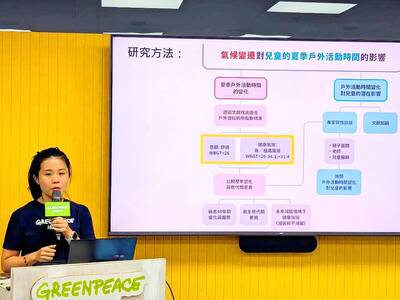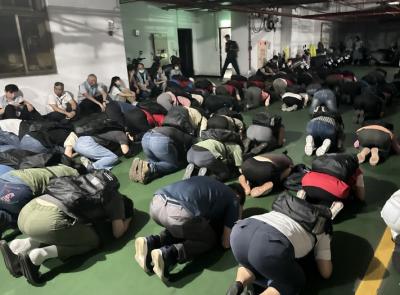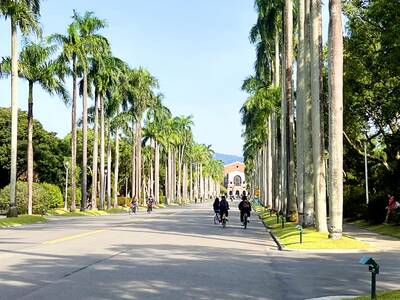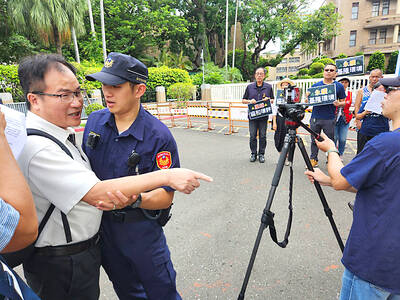The Democratic Progressive Party (DPP) does not have a consensus on US beef imports and should review all aspects of the issue rather than proceed based on political calculations, the Chinese Nationalist Party (KMT) said on Sunday.
Several civic groups staged an “anti-ractopamine march” in Taipei on Sunday to voice opposition to the import of meat products containing leanness--enhancing additives.
On the previous day, the DPP urged party members to join the protest, while demanding that the KMT refrain from lifting a ban on imports of US beef containing ractopamine residue “to facilitate trade relations with other countries.”
In response, KMT spokesman Yin Wei (殷瑋) said in a press release that the former DPP administration was also in favor of importing meat products containing ractopamine residue, and not only of US beef.
“Judging from the DPP’s stance on the matter, its party members should have participated in the protest marches held in August 2007 to voice their objections, so why did they remain silent at the time?” Yin asked.
“The DPP is deliberately trying to make the US beef issue a matter of public health,” Yin said.
“The Executive Yuan has pledged to take all factors, including public heath, national credibility and Taiwan’s trading interests, into consideration in its handling of US beef imports, based on its four-point policy position of ‘establishing a safe level of ractopamine in beef, differentiating safety standards for beef and pork imports, demanding mandatory labeling for beef imports and excluding imports of internal organs,’” Yin said.
Commenting on a proposal by the DPP that Taiwan should model its standards after those of the EU with regards to US beef imports, Yin said that given the lack of conclusive scientific evidence, demanding tighter import restrictions for US beef could be a violation of WTO rules.
The KMT spokesman added that the DPP’s so-called “EU model” should be assessed to ascertain whether it is a responsible approach.

The government should improve children’s outdoor spaces and accelerate carbon reduction programs, as the risk of heat-related injury due to high summer temperatures rises each year, Greenpeace told a news conference yesterday. Greenpeace examined summer temperatures in Taipei, New Taipei City, Taoyuan, Hsinchu City, Taichung, Tainan and Kaohsiung to determine the effects of high temperatures and climate change on children’s outdoor activities, citing data garnered by China Medical University, which defines a wet-bulb globe temperature (WBGT) of 29°C or higher as posing the risk of heat-related injury. According to the Central Weather Administration, WBGT, commonly referred to as the heat index, estimates

Taipei and other northern cities are to host air-raid drills from 1:30pm to 2pm tomorrow as part of urban resilience drills held alongside the Han Kuang exercises, Taiwan’s largest annual military exercises. Taipei, New Taipei City, Keelung, Taoyuan, Yilan County, Hsinchu City and Hsinchu County are to hold the annual Wanan air defense exercise tomorrow, following similar drills held in central and southern Taiwan yesterday and today respectively. The Taipei Mass Rapid Transit (MRT) and Maokong Gondola are to run as usual, although stations and passenger parking lots would have an “entry only, no exit” policy once air raid sirens sound, Taipei

Taipei placed 14th in the Quacquarelli Symonds (QS) Best Student Cities 2026 list, its highest ever, according to results released yesterday. With an overall score of 89.1, the city climbed 12 places from the previous year, surpassing its previous best ranking of 17th in 2019. Taipei is “one of Asia’s leading higher-education hubs,” with strong employer activity scores and students “enjoying their experience of the city and often keen to stay after graduation,” a QS staff writer said. In addition to Taipei, Hsinchu (71st), Tainan (92nd), Taichung (113th) and Taoyuan (130th) also made QS’ list of the top 150 student cities. Hsinchu showed the

Environmental groups yesterday filed an appeal with the Executive Yuan, seeking to revoke the environmental impact assessment (EIA) conditionally approved in February for the Hsieh-ho Power Plant’s planned fourth liquefied natural gas (LNG) receiving station off the coast of Keelung. The appeal was filed jointly by the Protect Waimushan Seashore Action Group, the Wild at Heart Legal Defense Association and the Keelung City Taiwan Head Cultural Association, which together held a news conference outside the Executive Yuan in Taipei. Explaining the reasons for the appeal, Wang Hsing-chih (王醒之) of the Protect Waimushan Seashore Action Group said that the EIA failed to address